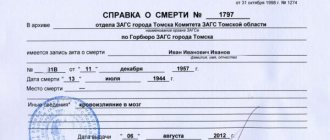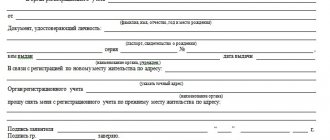Motivation
Why do you need to figure out how to sign a person out of an apartment?
If he is in prison, then there may be a variety of reasons for this. One of the most common reasons is financial. Nowadays, utility bills are quite high and paying for someone who does not currently live here may be too expensive. By achieving the release of a prisoner in prison, people will be able to reduce their utility costs to some extent.
- Other situations are also possible. For example, the court sentence was for a rather long period. During this time, life circumstances could well have changed a lot. In this regard, there may be a need to sell or exchange housing. When conducting such transactions, the presence of a prisoner registered in this living space who is in prison can significantly affect the circumstances of the transaction. In this case, it may also be that he himself will not object. However, even in this case it will need to be formalized properly. In addition, we must not forget: if a convicted person is discharged from his apartment, then upon returning from prison, such a citizen may, in some cases, demand that the transaction be declared invalid. Such fears are rarely justified, but new homeowners will still have some concern. And this, in turn, can affect the transaction price. If the tenants were not checked out during the sale, this could reduce the transaction price.
- Another common reason is that the convicted person may not be a very pleasant person to talk to and thus pose some kind of threat to those who live with him. In this case, it is quite expected that they may try to evict him from the living space he occupies.
Of course, these types of reasons may not be limited to the list given here. Only the most typical, most common of them were listed.
Discharge against the prisoner's wishes
It is not always possible to characterize family relationships as trusting. In addition, it may very well be the case that a prisoner poses a threat for some reason. In this and similar cases, it makes no sense to expect that he will voluntarily check out of this living space. How to discharge someone who lives in it from an apartment?
The overall flow of the procedure will remain broadly similar with one important difference. The right to discharge a convicted person in such a situation will need to be proven in court.
The procedure here can be roughly divided into two stages:
- preparing and conducting an appeal to the court;
- application to the passport office based on a positive court decision.
First, it will be necessary to prepare the appropriate package of documents for going to court:
- First of all, you need to make an application.
- At the passport office at your place of residence, obtain an extended certificate about those who live in the apartment in question.
- Those documents will be required on the basis of which the prisoner lives in this apartment. This may be a municipal rental agreement, or a purchase and sale agreement for this apartment.
- This package of documents must include a copy of the prisoner’s passport, certified by the prison administration.
- If possible, it is advisable (but not necessary) to provide a copy of the court verdict on the basis of which the prisoner was convicted. The optionality of such a requirement is due to the fact that this copy is usually requested by the court without the participation of the applicant.
Having submitted the package of documents under consideration to the court, you need to wait for its decision. If the court makes a positive decision on the issue under consideration, based on such a decision, you will have to directly apply for an extract from the apartment to the passport office at your place of residence. In this case, you will also need a package of documents. It will include the following papers.
- Relevant court decision.
- Applications from homeowners and copies of their passports.
- A copy of the convict’s passport, certified by the prison administration.
- A copy of the court verdict that imposed imprisonment on the convicted person.
After contacting the passport office located at the place of residence, the prisoner’s registration will be cancelled.
Eviction procedure with voluntary consent
If the prisoner has a fairly close, trusting relationship with his family, then it is quite possible that he will voluntarily want to facilitate this eviction. How to discharge a person who has been imprisoned from an apartment? First you will need to prepare the necessary package of documents. What will it include?
- First of all, there must be a correctly completed statement from the prisoner stating that he is asking to be released from his living space.
- A copy of his passport must be attached to it. This and the previous document must be certified by the head of the institution in which the convicted person is serving his sentence.
- A copy of the court verdict will also be required for presentation. It is usually issued to those who were one of the parties in the process in question.
- All homeowners must be present when applying.
- Applications from homeowners and copies of their passports will be required.
After the documents have been prepared, you need to come with them to the passport office at your place of residence and apply for an extract from this resident. Sometimes in such cases the presence of the person being evicted is required. This is not correct. In accordance with Russian legislation, a copy of the court decision allows for the execution of documents without the mandatory presence of the convicted person.
After the period of imprisonment ends, the discharged person will be able to restore his registration and continue to live in this apartment.
Extrajudicial eviction method
If the relationship between the family and the prisoner is good, this issue can be resolved without trial by contacting the passport office with the following documents:
- A copy of the convict’s passport certified by the head of the correctional colony (since the original is in prison for the entire term);
- Completed consent for deregistration by the convicted person (Form No. 6);
- Court sentence.
Read more: How to properly draw up a garage purchase and sale agreement
The verdict is the most difficult to obtain because copies are only given to the parties involved. You can (optional):
- Ask the prisoner or his lawyer to make a copy of the verdict;
- Approach the judge in person;
- Contact the court with a request to issue a copy of the verdict (if the first two methods did not bring results).
If it is impossible for the convict to arrive at the passport office, he fills out forms and applications in the presence of the head of the colony and a notary, who affix their signatures and seals.
Procedure
Below we provide a detailed algorithm of actions that need to be carried out for discharge in two situations - if the convicted person agrees to be discharged and if not.
By consent
When contacting the passport office to terminate the registration of a prisoner, you must submit the following documents to the specialist:
- Identification document of the person being deregistered. This is a copy of the convict’s passport, certified by the seal of the correctional institution and the signature of the chief.
- An application filled out on a special form and certified in the same way as a copy of the passport. The form can be obtained from a passport office employee. Anyone can fill out the application directly, but the convicted person must personally sign it. To do this, you will have to visit the institution where he is serving his sentence.
- A copy of the verdict. The procedure for obtaining a copy is quite complicated. It can be obtained both from the convicted person and from the court that made the decision. It may be difficult to obtain it in court. since the court issues a verdict only to the participants in the process.
All documents are submitted to a single window of the Department of Internal Affairs of the Ministry of Internal Affairs of the Russian Federation for the reception of citizens.
Authority employees may require the personal presence of the person being discharged. Such actions are illegal and should be appealed in court.
After your application, the passport office employees must cancel the registration of a person imprisoned in the MLS within no more than three days.
Without agreement
When applying to the court to unilaterally discharge a person who is in MLS, you need to perform the following series of actions:
- File a claim. The best option for this would be to contact a qualified lawyer. A specialist will help you fill out your application and advise you on any questions you may have. But you can do this yourself.
- Attach the necessary documents to it: a copy of the verdict, an extract from the house register, a copy of the passport of the person being discharged, a copy of your passport, a certificate of home ownership or a social tenancy agreement;
- Appear in court to participate in the hearing. The court, based on the facts presented and the documents provided, will consider the case and make a decision. It can be either positive or not satisfying the plaintiff’s demands.
- After receiving a satisfactory decision from the judicial authority, contact the department of the Internal Affairs Directorate of the Ministry of Internal Affairs of the Russian Federation at the place of residence of the convicted person to make changes to the register of residents.
How to write a claim?
The form and content of statements of claim are enshrined in Art. 131 of the Code of Civil Procedure of the Russian Federation, which does not allow deviations from the rules. An appeal to the court must be strictly in writing. There is no claim form for the discharge of a convicted person. The claim is drawn up according to the usual template, indicating specific circumstances.
First contact with the MFC or passport office
Even if it is clear in advance that the extract will be refused, you still need to contact the passport office to receive a refusal in writing. Otherwise, the court may refuse to satisfy the claim. They will force you to first try to solve the problem “in an amicable way” and only move on to extreme measures.
Going to court
When going to court, in a normal situation, you need to provide evidence that the plaintiff is right, but in this case, basic documents about the refusal to discharge and condemn the prisoner will be sufficient. In most cases, the court sides with the plaintiff, so if everything is in order with the papers and the situation is standard, then no problems should arise.
If the situation is non-standard and controversial, it is better to immediately seek help from an experienced lawyer. Without it, the likelihood of winning the case and getting the desired court decision will be minimal.
Second application to the MFC or passport office
Only after receiving a court decision can you re-apply to the MFC or passport office. In this case, one decision will be sufficient, on the basis of which the convicted person will be discharged without further questions. In this case, responsibility for deregistration is shifted to the court, so MFC employees will have nothing against it.
Sample statement of claim for the discharge of a convicted person from an apartment 2020
Before filing a claim, the jurisdiction of the case must be determined. Applications for deregistration are accepted in the district court at the location of the property.
Contents of the claim for the discharge of a convicted person:
- name of the judicial authority;
- Full name and contact information of the plaintiff, defendant;
- territorial location of an apartment or private house;
- information about the right to dispose of real estate;
- information about the defendant’s move-in date, as well as family ties (if any);
- the essence of the problem (for example, serving a sentence in a prison);
- an indication of the absence of voluntary discharge on the part of the defendant;
- provisions of law;
- requirement to compulsorily discharge the defendant;
- list of documents;
- date and signature of the plaintiff.
It is important not to miss a single detail. Particular attention is paid to the evidence base, or more precisely to documents (sale and purchase agreement, house register, certificate of ownership, etc.).
Documentation
Let's consider two packages of documents for canceling the registration of a convicted person. The first list of documents concerns discharge with the consent of the prisoner. The second package is for forced discharge in court.
List of documents for the voluntary discharge of a convicted person:
- passport of the apartment owner;
- a written statement from the prisoner (with a mandatory signature) or a statement from the housing manager (owner);
- a copy of the passport of the person being discharged;
- a copy of the sentence imposing a prison sentence.
Difficulties may arise when obtaining a copy of the court verdict . Typically, offices do not hand over such documents to strangers. Therefore, you will need to make a request to the court with a request to provide a copy of the verdict for discharge. In addition, a copy of the verdict can be obtained from the convicted person. According to the law, he has the right to demand the verdict for review. If you are on good terms with the prisoner, ask him to provide you with a copy of the sentence.
List of documents for deregistration in court:
- statement of claim;
- a copy of the convicted person’s passport;
- title documents for the apartment (sale and purchase agreement, deed of gift, certificate of inheritance, certificate of ownership);
- extended copy of the house register (if necessary);
- receipt of payment of state duty.
It is not necessary to obtain a court verdict. During the processing of the claim for discharge, the judge will independently make a request to the archive of verdicts. The plaintiff may be required to provide a birth certificate, marriage certificate, or other documents as proof of family relationships. The burden of proving the legality of the discharge of a convicted person falls on the shoulders of the owner of the apartment (private house).
Is it possible to release a prisoner from an apartment?
It is worth making a reservation right away: it will not be possible to discharge such a relative forever. He can only be discharged for the period during which he serves his sentence. But when the person who has served his sentence returns home, he will have to be registered again - the Constitution protects him in the same way as any other citizen of his country. In addition, in addition to the Constitution, the “caretaker” is protected by Article 71 of the Housing Code of the Russian Federation, which says that “the temporary absence of a tenant of residential premises under a social tenancy agreement <...> does not entail a change in the rights and obligations under the social tenancy agreement” ( if the apartment is not privatized).
Situations when someone has to be evicted from an apartment are not uncommon. The main share of “discharges” are children who, after their parents’ divorce, leave the apartment of one parent for another, or former spouses themselves. However, there are other circumstances in life when, for example, relatives are faced with the question of “expulsion” from home of a family member who is serving time in prison.
Please note => Father's Day 2020 in October
Features of the discharge of convicts from a municipal non-privatized apartment
Solving the issue of deregistering those who lived in a municipal apartment is simple. Having a court verdict that has entered into legal force, you can take it to the Federal Migration Service office and write a corresponding statement .
You will need the applicant's passport, a copy of the court verdict that has entered into legal force, and an application for the FMS employees to make the necessary entries in the documents.
How to get a copy of a court verdict in a criminal case
If you are not a participant in the process, then no one will simply give you a copy of the verdict. To get a copy you can:
- write an application to the court with a request to issue a copy of the decision, where as the reason indicate the need to discharge the convicted person;
- ask the convicted person to give you a copy;
- try to explain to the assistant referee or judge the need for a copy of the decision.
This will allow you to avoid paying utility bills for a person while he is in prison. When he returns home, he can just as easily register again.
How to discharge a convicted person from an apartment with his consent
If the convict himself wishes to be discharged, then he gives the owner his application, a copy of his passport, certified by the head of the camp or commandant. Having these documents will allow you to contact the Federal Migration Service office and have the citizen in the colony discharged.
Methods for discharging a convicted person from an apartment
How, and at whose expense, you became the owner does not invalidate the transaction. If the former owner does not consent to deregistration and is still in prison, then this is also not an obstacle to deregistration by the owner of the property. Everything is fine with you. With regard to prisoners, changes have been made to the Housing Code of the Russian Federation, “discharge” him.
Please note => Is it possible to change the annuity payment to a differentiated one at Sberbank
Good afternoon. Similar situations have already been discussed here. but nevertheless... The owner of the property, located in the IC, wants to sell his apartment. To do this, he calls a notary and issues a power of attorney to his brother for the sale. Later, to check out the apartment for sale, he again calls a notary to fill out applications for deregistration. accounting and power of attorney for representation on issues of extract and registration. But the Federal Migration Service does not accept these documents. The representative has the verdict in his hands, notarized statements and a power of attorney from the citizen who wants to be discharged... How to convince the FMS specialists? It takes a long time to appeal a refusal through court. The buyer of the apartment will not wait(.
From the history of the issue
In the Soviet Union the problem was solved simply . Article 60 of the RSFSR Housing Code asserted the right of a tenant to be absent for six months. If he was absent longer, the housing was subject to alienation .
There were, of course, exceptions to the rules, but they concerned persons serving military service, or those whose long-term absence was caused by work.
The convicts did not enjoy this privilege, and it turned out that many of them simply lost their housing.
At some point, this law was considered contrary to the Constitution. In fact, it was an additional punishment for a person who had already served his sentence, which led to the Resolution of the Constitutional Court of the Russian Federation No. 8-P of July 23, 1995. It stated that from now on, deprivation of liberty cannot be a basis for deprivation of housing.
This is also reflected in the Housing Code, Article 71 of which states that the temporary absence of the tenant of the living space does not entail loss of the right to use.
Changes in legislation
In 2014, a draft law that proposed registering convicts at the place where they were serving their sentences, without deregistering them at their main place of residence.
The law has not yet been adopted , but the attempt to do so is very significant.
A convicted person, in order to protect himself from unwanted actions of relatives, must write a statement that he retains the right to living space. This document must be sent to the municipal administration .
The fact is that a person serving a sentence will be deregistered, but information about this is usually stored only in the passport and visa service , so relatives can hide and register in other people’s apartments.
Changes in legislation have largely protected convicts. Now they can legally defend their right to housing , even if relatives managed to use the apartment at their discretion during their absence. But what about relatives who also have the right to their own interests, and these sometimes run counter to the interests of the convicted?
Discharge methods
The most successful and simplest way is at the convict’s own request .
a trusting relationship between him and his relatives and he does not intend to oblige the family to pay his share of utility costs, then the convicted person will be required to submit an application for deregistration and a copy of his passport , certified by the administration of the correctional institution.
These documents must be submitted to the passport office. When the term of imprisonment comes to an end, the former convict will be able to return home and restore registration .
Deregistration against the will of the convicted person
This is already more difficult, since you will have to seek an extract through the court , since, in accordance with Article 7 of the Law of the Russian Federation No. 5242-1 of June 25, 1993, it is the court decision that is the basis for removing the convicted person from the registration register.
According to FMS Order 208 of 2007, this is possible without the personal presence of the person serving the sentence.
However, a huge number of nuances are possible here, which depend on the type of housing (own or municipal) and on the status of the convicted person (owner or non-owner).
Required documents
If the convicted person agrees to deregistration, the following will be required:
- statement of the convicted person;
- a copy of his passport certified by the administration;
- statement from the owner of the property (if the convicted person is not one);
- homeowner's passport;
- a copy of the verdict as a basis for deregistration.
Usually, difficulties arise in obtaining the last document, since the court can only issue a copy of the verdict to the parties to the case. The easiest way is to get it from the convicted person himself, but you can write a statement to the court asking for the papers to be issued and explaining the reasons for the need.
Sometimes it is possible to speak personally with the judge or his assistant and obtain the necessary documents .
If the convicted person refuses to be discharged, the following will be required:
- a statement of claim to the court, which sets out a request to remove the convicted person from the register;
- a copy of the convicted person’s passport, certified by the administration;
- extended extract from the house register;
- certificate of ownership of the apartment or social tenancy agreement.
Usually in such cases the court itself requests a copy of the verdict, but just in case you can be on the safe side and attach it too.
Extract from a privatized apartment
There are possible options here.
did not take part in the privatization and refused in favor of the home owner.
Citizens who refuse the privatization of housing in favor of other persons receive the right to use it even if the owner changes. This is guaranteed by the Housing Code, Art. 31, paragraph 4.
A convicted person can leave such housing only with his own consent . You will need to obtain a special form from the passport office, hand it to the person serving your sentence to fill out, and then have it certified by the administration of the institution.
If a convicted person does not want to voluntarily be deregistered for the duration of his imprisonment, this can be achieved by going to court.
Only after returning will he be able to restore registration and continue to use the apartment without ownership rights.
The convict participated in privatization and is the owner of a share in the apartment. it will not be possible to make any transactions with housing without his consent .
There is also one important point here: even if you manage to take a power of attorney for the sale , he will be able to subsequently challenge the transaction, saying that, for example, he was pressured.
Of course, this may not happen, but apartment buyers are unlikely to want to take risks .
The apartment was privatized already at the time the person was in the colony, and he refused privatization.
In this case, the convicted person can be discharged for the duration of his imprisonment, but he will still have the right to use the apartment
Reasons for discharge
When determining the grounds for deregistering a person, you should refer to Resolution No. 713; Chapter 5 provides an exhaustive list of them, which you can rely on when applying to deregister a person. In general cases, the grounds for deregistration from place of residence may be:
- Death of a person.
- Declaration of a citizen as missing by the court.
- Detection of falsification of documents that were presented during registration.
- Establishing the fact of unlawful actions of officials who made the decision to register this person.
- Detection of registration fictitiousness.
Please note that all cases other than the death of a resident require a preliminary hearing. Only after a positive decision on the right to remove a person from registration is the documentation transferred to the appropriate department of the Ministry of Internal Affairs and carried out.
The court may decide to evict a person from a residential premises based on other reasons, the main thing is that they are proven. The grounds for deregistration vary depending on whether the living space is municipal or private property.
Read more: When child benefits are transferred to a Sberbank card
From a council apartment
When registering in a municipal apartment, a social rent agreement for the premises is concluded with a person. Regardless of whether a citizen is a responsible tenant or is simply included in the contract as a tenant, his rights will not change. All people registered in municipal housing can:
- Use the premises for their intended purpose on an equal basis with others.
- Give your consent or refusal to register a new tenant.
- Request the discharge of one of the registered persons on the basis that he violates the rules of the Housing Code of the Russian Federation.
Registration in social housing gives the right to further participate in its privatization, which means receiving a certain share of the property as your undivided property.
Convicts, regardless of the size of the assigned term, cannot be discharged from a municipal apartment. They remain permanently registered until they serve their sentence completely.
From a privatized apartment
Privatized property is private property. It is disposed of by the owner of the premises at his own discretion. For this type of real estate, two factors are important:
- Who is the actual owner or co-owner?
- Participation in privatization or refusal from it in favor of other persons.
If the tenant was registered in a municipal apartment and at the time of its privatization remained registered in the premises, then he has rights to part of the property. Even if a citizen voluntarily renounces his share in the apartment, he can legally live in this living space for life, which means he cannot be forced out.
The situation is different when someone registered in a privatized apartment does not have any ownership rights. In this case, the owner may apply to the court to remove the convict from the register.
Convicted against deregistration
In this case, feel free to contact the magistrate’s court at the location of your home with a statement of claim for deregistration. Documents you will need:
- receipt of payment of state duty;
- a document confirming your ownership with a notarized copy;
- extract from the house register;
- a copy of the ZK’s passport, visaed by the camp administration;
- a copy of the statement of claim in two copies.
The court itself will request a copy of the verdict.
There are other publications on our website devoted to the nuances of discharge from residential premises in various situations. From them you can find out what documents you may need, where you need to go, whether you can be discharged while in another city and how to do this with the help of State Services, how forced discharge occurs through the court, as well as how to discharge a deceased person.
How to file a claim?
Indicate your full name and passport details, address of the living space, what rights you have to it, what documents confirm these rights.
State the full name and passport details of the defendant and tell us on what basis he received his residence permit.
Explain that he lives in MLS (places of deprivation of liberty), but due to his registration in your apartment, you are forced to bear additional costs for utility bills.
You can quote the Civil Code of the Russian Federation:
- Article 209, paragraph 1: “The owner has the right to own, use and dispose of his property.”
- Article 304: “The owner has the right to demand the elimination of any violations of his rights, even if these violations were not associated with deprivation of possession.”
Art. 304 Civil Code of the Russian FederationThe owner may demand the elimination of any violations of his rights, even if these violations were not associated with deprivation of possession.
REFERENCE: In this case, your right to pay only for actually provided utilities is violated
If the court’s decision is positive, then there are two options:
- the convicted person has no property rights. By a court decision, you will discharge the person and will be able to sell the premises or carry out any other transactions with him.
- The convicted person has a share in the apartment.
It is possible to discharge the owner from his house while serving his sentence, but no transactions with this apartment will be possible without his consent.
Upon release from prison, the legal owner will register on his territory again.
Theoretically, of course, you can go to the colony and get the prisoner’s consent to sell, but such a deal will later be easy to challenge: upon release, the former owner will declare that he signed the consent under pressure.
ATTENTION: Smart buyers will not want to deal with such living space, or will offer a price below the market price. It is better to wait to sell until the end of the term.
Statement of claim for recognition of the loss of the right to use residential premises and deregistration
The convicted person refused privatization in favor of other owners (before or during imprisonment)
According to the Housing Code of the Russian Federation, Article 31, paragraph 4, in this case a person receives the right to lifelong use of housing, regardless of the change of owner. In other words, he does not have a share in the apartment, does not receive profit from its sale or rental, but he can live in it as long as he wants.
As in the previous paragraph, a prisoner can be deregistered only for the duration of his stay in the MLS. The law does not prohibit selling such an apartment, but it will be difficult to find buyers. After all, in a few years, a vacated roommate will come to the new owners, and they will not be able to kick him out.
It is extremely unprofitable for the state for former criminals to leave the colonies “to nowhere.” This will lead to an increase in homelessness and increase the likelihood of recidivism. Therefore, laws are adopted in such a way that it is very difficult to deprive prisoners of housing. But if your goal is just to reduce your utility costs, then nothing is impossible.
Where to check out of the apartment
The reasons may be different: selling real estate, moving, leaving for military service, eviction by court order, and others. Yes, there are no legal restrictions, but employees of the relevant authorities may require evidence of the possibility of subsequent registration if a person, for example, has minor children. There may be problems with discharge if there are rent arrears.
No. 5242-I “On the right of citizens of the Russian Federation to freedom of movement, choice of place of stay and residence within the Russian Federation”, the prisoner is registered at the place of stay in the colony (or in the correctional center) only after that. how he was deregistered at his place of residence. The decision to deregister is made on the basis of a court decision that has entered into force.
May 06, 2020 yurisaktobe 672
Share this post
- Related Posts
- How many years in advance can you receive compensation for unused vacation?
- Details for Payment of State Duty for Registration of Property Rights
- Is it possible to buy a house in the village with maternal capital?
- How to correctly specify in the contract the payment of penalties under a lease agreement
De-registration options
There are two options:
- in agreement with the person serving his sentence;
- without approval.
The first method is quite realistic and is suitable for those who maintain normal human relations with the person in custody, but want to pay utility bills only for citizens who are actually currently living in the residential premises.
The second option is possible if the housing is in municipal ownership, and the trial has already taken place and the decision has gained legal force.
In this case, the registration will be canceled, but only for the period of the prison term.
In general, there are a lot of situations, and the subtleties of legal procedures depend on the status of the convicted person (in relation to property rights to housing and the degree of relationship), as well as on whether the person participated in privatization or refused it, etc.
In the vast majority of cases, discharge is possible only through the court (Article 7 of the Law of the Russian Federation No. 5242-1 of June 25, 1993).
You can learn about how to apply for an extract from an apartment through the MFC or the State Services portal, as well as what documents are required for the procedure.
How to apply?
First of all, you should find out what papers will be needed and where it is best to apply. If a person is in prison, then the procedure is allowed to be carried out without presence (FMS Order No. 208 of 2007).
You can complete this procedure in one of the institutions:
- FMS;
- MFC;
- passport department at the housing department.
The only difference is the timing: the fastest result will be obtained if you go directly to the territorial division of the FMS, since in this case time will not be wasted sending papers to the migration service and back.
Required documents
The mere consent of those in the camp for those serving time is not enough, although it is precisely the determining factor for success. The following documents will be needed:
- application in form No. 6;
- passport;
- court sentence.
The application form can be downloaded from the Internet or from a passport officer, you can even fill it out, but the person who has violated the law must put his own signature.
The passport is usually confiscated upon arrest, and it is kept by the administration of the institution.
Therefore, a copy of the prisoner’s passport and a signed application must be certified by the head of the zone or a substitute person with his signature and seal of the institution.
A more difficult task is to obtain a copy of the judgment . You can pay a visit to the office of the court where the trial was held, or directly to the judge, or to the secretary with a request for the issuance of this document.
Usually, indirect participants in the process are denied a copy of the court decision, but, as a last resort, the person serving the sentence himself has the right to receive such a document upon his request and will be able to give it to his family member.
Timing and cost
For the convenience of citizens, the work of the bodies authorized to carry out registration actions is structured in such a way that documents are accepted in a single window , and this is where a set of papers should be submitted.
The period for processing the cancellation of registration cannot last more than 3 days after submitting the application (clause 22 of the Administrative Regulations).
Since the service for terminating the validity of a residence permit is a state service, when it is provided by bodies specially authorized for this purpose payment for the provision of such a service is not required , and in this case there is no state duty.
People with hypertension go to jail
Four inseparable friends live in a poor neighborhood of Bombay. After one of them. If you suspect that you may soon be arrested (well, as they say, you shouldn’t swear off prison or money), try to prepare as much as possible for this difficult, but by no means hopeless, stage of life. Moreover, in different bullpens the order is different: where they miss one thing, they delay another. More precisely, a bag (a simple one made of canvas without locks, zippers - a briefcase, a suitcase will still not be allowed through) can be assembled calmly and competently. But there is still a list of “allowed” essentials that you should always take. Both are valued quite highly in prison (they are even a kind of unit of calculation, like money). The main point is that they get with you to prison undetected (there are several “folk” methods for this), because money can only be transferred by transfer. Take several packs of tea, but not granulated, but leaf black. There they can be handed over and deposited into an account so that they can shop at the prison kiosk, rather than wait for a transfer from home. Take cigarettes that are not the “coolest” ones, middle class, but larger ones. According to the Code of Administrative and Criminal Violations, it is prohibited to take money, currency, securities, things, and jewelry into prison. Also - food products that require heat treatment (except for tea, coffee, milk powder and instant concentrates), homemade canned food and yeast. Read more about how to behave during a period of forced imprisonment in our article How to Survive in Prison.
They decide to conduct experiments on him with inhuman torments. He is sent to prison. On January 9, in Grozny, the head of the Chechen representative office of Memorial, Oyub Titiev, was arrested for drug possession. And on the night of January 17, the office of the Ingush representative office of Memorial burned down in Nazran. Memorial is the most important human rights organization in Russia. It has been working in the North Caucasus since the early 1990s and is now a key structure monitoring the human rights situation in this region. Every year it becomes more and more difficult to continue this activity: human rights defenders from Memorial and other organizations are threatened, attacked, and imprisoned. “Medusa” recalls the main episodes of the persecution of “Memorial” in Ingushetia and Chechnya.
Please note => From How Much And Until How Much Noise Is Legally Allowed









